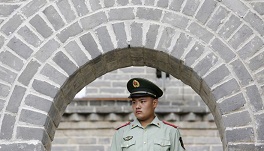By Kabir Chibber @quinto_quarto July 20, 2014
It can be grim to get on the wrong side of the Chinese government. Reuters/Jason Lee
“I began to talk about Thoreau’s essay on civil disobedience, but quickly felt like a ridiculous pedant. What’s the point of talking about the virtues of civil disobedience in a Beijing police station?”
+
So wonders Murong Xuecun, a Chinese author who was interrogated by the Chinese secret police for seven hours and wrote about it for the New York Times.
+
He was asked to come to the police station “for a chat” by the guobao after reading an essay at a private commemoration of the 1989 Tiananmen Square massacre. Others who had contributed had been arrested already. And so Murong voluntarily attended the meeting and found himself in a shoe-print-covered room discussing the nature of the law with two officers.
+
“We discussed whether citizens ‘must obey the law,’” Murong wrote. “I said good laws should be obeyed but evil laws must be challenged. They strongly disagreed, insisting that the law must be obeyed whether it’s good or evil. ‘And you’re a graduate of the China University of Political Science and Law, eh?’ the younger one asked mockingly.”
+
In the end, after signing a transcript of the conversation, Murong—whose real name is Hao Qun—was released. In this respect, Murong got off pretty lightly. In 2011, the artist Ai Weiwei was detained for 81 days and interviewed more than 50 times. Officers watched him round the clock, their faces just inches from his, even as he slept—insisting he keep his hands on top of the blanket throughout the night. After 14 days, he was moved to an army base where everything was padded with foam, even the taps.

